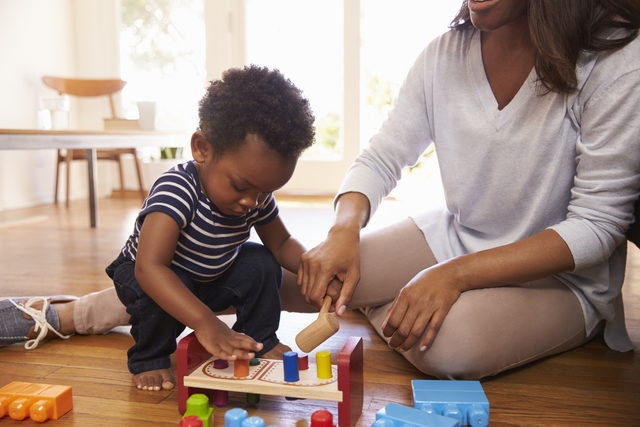At nineteen months, your toddler is showing more independence as they’re exploring and learning the world around them. The major developmental strides happening during these toddler months often impact sleep. I’m answering the most frequently asked questions about 19 month old sleep schedules, naps, regressions, and more.
19 Month Sleep Schedule Guidelines
Every little one is unique and your toddler’s day will depend on when they wake, how long they nap, and individual cues. Try aiming for these age-appropriate guidelines. These are not intended to be a rigid schedule, simply a guide for setting up a flexible routine.

Text version of 19 month sleep guidelines
| Daytime Feedings: | 3 meals, snacks as needed |
|---|---|
| Goal Daytime Sleep: | 2-3 hours |
| Sweet Spot Bedtime: | 7:00-8:00 pm |
| Number of Naps: | 1 |
| Wake Windows: | 4-6 hours |
For more details on these recommendations, keep reading.
What are the wake windows for a 19 month old?
For most 19 month olds, wake windows are about 4-6 hours. On a one-nap schedule, the morning wake window is typically longer than the afternoon wake window.
To set up a daily routine for your 19 month old, here’s a guide:
-
About 5-6 hours after Wake Time = Nap
-
About 4-5 hours after the end of the Nap = Bedtime
What is a sample sleep schedule for a 19 month old?
Here is one example of how a day for a 19 month old might play out. Keep in mind that this is just an example and your little one’s schedule will depend on the wake windows that work best for them, the time they wake in the morning, how long they nap, and when they eat. While each day may look similar, there may still be some variations as the schedule is responsive to your little one’s needs.

Text version of 19 Month Old Sleep Schedule
| Time | Activity |
|---|---|
| 6:15 am | Wake |
| 7:00 am | Breakfast |
| 9:20 am | Snack/Nursing (optional) |
| 11:30 am | Lunch |
| 12:00 - 2:30 pm | Nap |
| 2:45 pm | Snack/Nursing (optional) |
| 5:15 pm | Dinner |
| 6:30 pm | Snack/Nursing (optional) |
| 7:00 pm | Bedtime |
Note: If you’re looking for a sample 19 month old sleep schedule with two naps, check out 17 month sleep schedules.
How much sleep does a 19 month old need?
We want to aim for 12-14 hours of total sleep in a 24-hour period for a 19 month old. Our goal is 10-12 hours of overnight sleep and 2-3 hours of daytime sleep.
How many naps are best for a 19 month old?
By 19 months, most toddlers have transitioned to one nap. The typical age for the 2 to 1 nap transition is between 13-18 months. If your 19 month old is still taking two naps and sleep is going well, that’s ok! If, however, your toddler is struggling to fall asleep at bedtime, waking in the night, or waking before 6:00 am, know that it’s probably time to transition to one nap.
How long should I let my 19 month old nap?
The goal for total daytime sleep for a 19 month old is 2-3 hours. If your toddler is still sleeping at the 3 hour mark, we’ll want to wake them in order to keep bedtime in the sweet spot of 7:00-8:00 pm and allow for enough active awake time to preserve great night sleep.
If 2-3 hours of daytime sleep sounds like a dream, my Conquering Naps class will teach you how to achieve the restorative daytime sleep your little one needs.
What time should a 19 month old go to bed?
The sweet spot bedtime for a 19 month old is between 7:00-8:00 pm. A bedtime in this range tends to help babies and toddlers fall asleep and stay asleep during the night. I understand that, for some families, bedtime is sometimes outside of this range. If this is your situation and sleep is going well, that’s great! You don’t need to make a change.
Keep in mind that sometimes, a bedtime after 8:00 pm can lead to more disrupted overnight sleep. If bedtime is after 8:00 pm and your 19 month old is having night wakings or early morning wakings, try moving bedtime earlier for a couple weeks to see if it helps.
There are also a few situations when moving bedtime earlier (think 6:00-6:30 pm) can really help overnight sleep. You may want to shift bedtime earlier than 7:00 pm if:
-
A nap was refused or short
-
Daytime sleep was less than 2 hours total.
-
Your 19 month old has been awake for 4 hours and is really having a hard time making it to bedtime, especially if they've recently transitioned to 1 nap or they’re sick.
What are some 19 month old milestones?
These are a few milestones you may see around 19 months:
-
Walking and running confidently
-
Climbing stairs or furniture
-
Eating more independently
-
Imitating you (or siblings) around the house
-
Showing a preference for one hand over the other
Keep in mind that these milestones are based on age ranges and every child develops at their own pace, so your little one may reach these before or after 19 months. Check with your pediatrician if you have any questions or concerns about your 19 month old’s development.
What are some activities I can do with my 19 month old?
Here are some ideas for ways to engage with your 19 month old:
-
Explore a local playground or library! Check with your local library or community center to see if they offer free activities for toddlers.
-
Set up a shallow storage bin with some water, add some small floating objects (like ping pong balls or small plastic blocks) and let your toddler scoop out the objects with measuring cups. (Safety Tip: Be sure to keep a close eye on your toddler with any water-related activity.)
-
Encourage pretend play using a doll or stuffed animal. This helps develop imagination, social skills, and creativity!
I have some favorite toys for 19 month olds here.
Safety Tip: As your 19 month old is becoming more mobile and craving more independence, it’s a good time to look around your house for any new safety concerns, like cabinets or furniture your toddler may not have been able to reach before. Check to make sure furniture is anchored and door knobs are child proofed.
Is there a 19 month old sleep regression?
It’s possible! We do often see an 18 month sleep regression, but every little one develops at their own pace, so it’s possible this regression may be affecting your toddler at 19 months. Let’s talk about some of the common culprits of disrupted sleep at this age:
-
Experiencing separation anxiety. This could look like your 19 month old crying when entering their room, standing in the crib in protest, or showing strong preference for one caregiver at bedtime. To help ease separation anxiety at sleep times, practice short periods of intentional separation and play games like Peek-a-Boo.
-
Learning new skills. You’ll want to give lots of opportunities to practice those skills during awake time as this decreases their motivation to practice during sleep time.
-
Needing a wake window adjustment. If your 19 month old is on the lower end of the age-appropriate wake window range, gradually add a little more time to each wake window (think 10-15 minutes). Give them a few days to adjust and then reassess. This gradual shift will help avoid overtiredness.
-
Being ready to drop a nap. If your 19 month old is still taking 2 naps, it may be time to move to one nap.
-
Being overtired. Being overtired can make it hard for your toddler to fall asleep and stay asleep. If wake windows were recently increased or a nap was recently dropped and your 19 month old is now fighting sleep, try decreasing wake windows a bit to see if this helps.
Please know, any time your baby experiences a sudden change in sleep, we always want to first check for any physical discomfort, like illness or teething (at 19 months, your little one may still be cutting that first set of molars). Once you’re sure that your little one is healthy and comfortable, know that being consistent with your approach to sleep helps to move through a sleep regression quickly. Sleep regressions typically last 1-2 weeks, but letting go of healthy sleep habits during this time can lead to ongoing struggles. Hang in there!
Can I sleep train my 19 month old?
Yes, you can. It’s never too late to have a great sleeper! If you’re ready to sleep train, the 5–24 Month Collection is a fully customizable, holistic plan that will allow you to stay emotionally connected to your little one. I’ll guide you through a step-by-step plan for consolidated nights, solid naps, and managing all the bumps along the way to help you achieve your family’s goals.
Still have an 18 month old? Check out my 18 month sleep schedule. Already have a 20 month old? I've got you covered with my 20 month sleep schedules.








